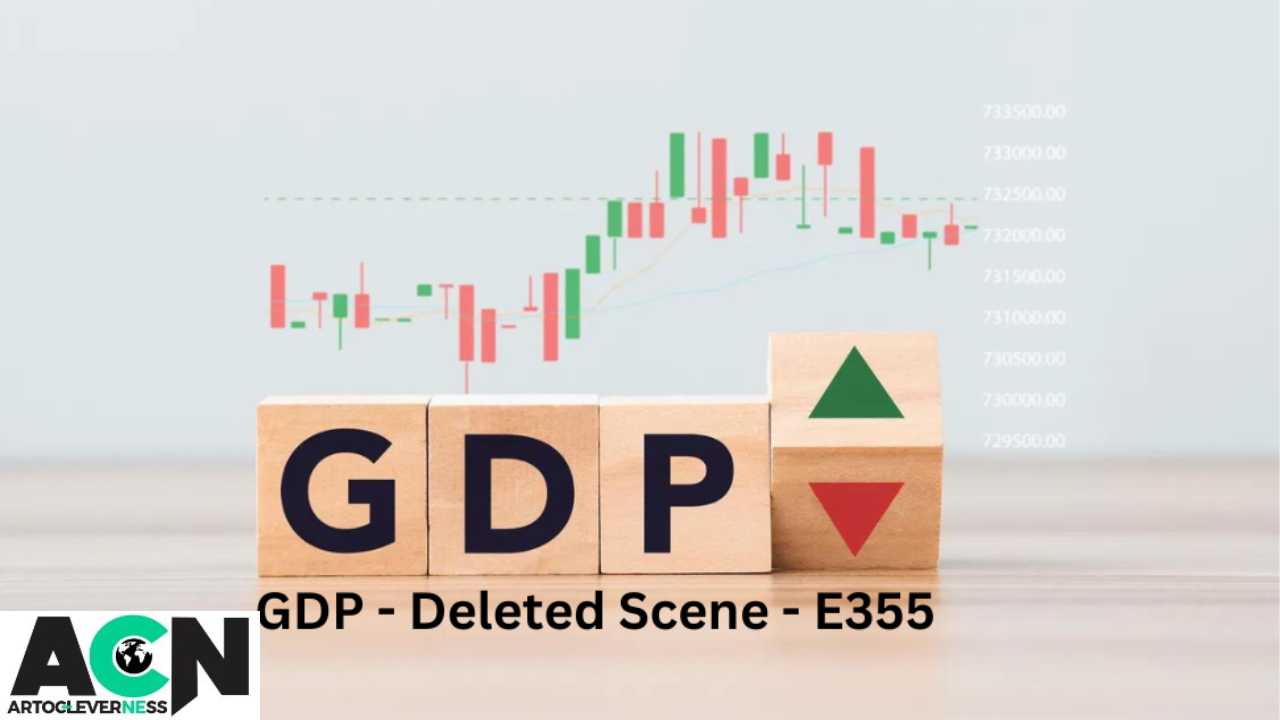This is intertextual because ‘GDP’ combined with ‘Deleted Scene’ and the998 Part Four: Intertextuality in The Hunger Games: Catching FireE355′ is quite an extraordinary merger of components acquired from different contexts. On the other hand, ‘deleted scene’ refers to the scenes removed from the cinema or a television show, while ‘E355’ is a show number, for instance.
The term GDP – Deleted Scene – E355 may refer to a segment taken from a media production regarding economics. To the degree that media uses and gratifications are directionally right on our theory and prior findings, this understanding may be helpful in both media and financial analysis.
What is GDP? – Deleted Scene – E355?
Gross Domestic Product (GDP) is an index of a country’s economic performance through the total value of products developed or services provided in any given period. Deleted scene’ means the part of a scene removed from the film during the postproduction process, usually for tempo or topicality.
The use of the term ‘E355’ implies a given fragment or perhaps a section. Therefore, ‘GDP – Deleted Scene – E355’ may refer to a specific educational segment related to GDP excluded from the final TV production.
The following topic aims at establishing why Gross Domestic Product (GDP) is not a perfect measure of economic performance:
As popular as GDP is, it has a number of drawbacks. The GDP – Deleted Scene – E355 is more or less a measure of a country’s economic activities and does not measure environmental quality, social health status, or inequality. As a result, while calculating the welfare of nations, the main index, the GDP, has been revealed to give partial information.
What is Green GDP?
Green GDP is similar to GDP, but it includes additions and subtractions of environmental impact costs within GDP. These factors explain the diminishment of natural resources and the deterioration of the environmental background.
These and other factors are combined in GDP – Deleted Scene – E355 to give a broader picture of growth performance and to focus on sustainability and long-term growth.
How the Economic Development of Bhutan Is Assessed?
Bhutan is unlike any other country you will hear about that use GDP – Deleted Scene – E355 to measure success; instead, GNH represents the country’s progress. These factors include psychological well-being, cultural aspects, and environmental aspects such as conservation.
These have defined Bhutan’s policies, making the country aim at sustainable development and happiness rather than traditional economic development.
Costa Rica: What has been learned from the model of economic growth?
Tourism is a very developed sector in Costa Rica, and it is practiced under sustainable development. Relative to other countries, the country has invested heavily in renewable energy, conservation, and education subsectors.
These include a very large budget allocated to protected areas and a pledge to reach zero carbon emissions. This paper presents a case analysis of Costa Rica and learns that adopting sustainable practices will be economically functional while preserving the environment, which other nations can measure.
Economic valuation of environmental and social investment means extending traditional methods by adding the ecological footprint, issues of social justice, and personal well-being.
Some of the indices are the Human Development Index (HDI) and the Social Progress Index (SPI). These are, as a result, more comprehensive in capturing the level of development of a particular nation, considering both economic and other factors.
The Role of Deleted Scenes in Media Messages

They refer to fragments of content material removed during the postproduction of different media products. They are automatically omitted to enhance paring here and there, continuity, or association.
In educational contexts, the deleted parts of the video can be rich in detailed information, which would support the general understanding of the issue.
Why Might an Economic Scene Be Deleted?
Economic scenes, like those explaining GDP – Deleted Scene – E355, might be deleted for several reasons. They can be too technical or detailed, potentially disrupting the narrative flow.
Additionally, creators might decide that the information, while valuable, is not essential to the main storyline, opting to simplify the content for broader audience appeal.
The Benefits of Deleted Scenes for Learning
Deleted scenes can significantly enhance learning by providing additional context and detail. They often delve deeper into complex topics, offering extended explanations and examples.
For instance, a GDP – Deleted Scene – E355 might explore its calculation methods or real-world implications in greater depth, aiding educational efforts.
How Are Deleted Scenes Recovered and Used?
Deleted scenes are usually lost for a while. They are often saved for special releases, such as DVDs, Blu-rays, and streaming platforms, where they are included as bonus content.
These scenes can be used in educational settings as supplementary material, enriching the learning experience by providing more comprehensive coverage of the subject matter.
Pros and Cons of GDP – Deleted Scene – E355
Pros:
- Provide additional insights into economic concepts.
- Offer more educational value and detailed explanations.
- Enhance the viewer’s experience by showing more of the creators’ vision.
- It can be used as supplementary educational content.
Cons:
- It may disrupt the story’s pacing if included in the main content.
- It can be too technical for general audiences.
- It is only sometimes necessary to understand the core narrative.
- It may consist of unrefined or less polished ideas.
Conclusion
The Value of Deleted Scenes and Understanding GDP – Deleted Scene – E355, such as ‘GDP – Deleted Scene – E355’, offer valuable insights and additional content. While they might not be essential to the main narrative, they enrich the viewer’s experience and understanding. These scenes can provide deeper insights and more detailed explanations in educational media, enhancing learning.
Understanding GDP – Deleted Scene – E355 and its limitations helps us comprehend the broader economic picture. We can gain a more holistic view of economic progress by exploring alternative metrics like Green GDP and learning from innovative approaches in Bhutan and Costa Rica.
Combining media content and financial analysis in unique ways, as suggested by ‘GDP – Deleted Scene – E355’, underscores the importance of multi-faceted perspectives in education and economic assessment.
(FAQ)
What is GDP – Deleted Scene – E355?
Part of the E355 term links quantitative and qualitative indexes, where GDP is illustrated as the deleted scene. This is true because GDP, for instance, does not consider the quality of air, water, or education or showcase the differences in income between the rich and the poor.
What is Green GDP?
Therefore, the green GDP is a GDP calculation that subtracts environmental costs further from the traditional GDP, giving a sustainable picture of economic performance.
How has Bhutan indexed its economic development?
Gross National Happiness in America is used to measure economic progress, and the country has a vision of comprehensive and sustainable welfare.
What lessons can be learned from Costa Rica’s approach to economic development?
This indicates that sustainable development in Costa Rica has proved that saving the environment and increasing the economy are not mutually exclusive.
How do we introduce environmental and social assessment into economic assessment?
Welfare measures such as the Human Development Index (HDI) and the Social Progress Index (SPI) integrate these metrics.


